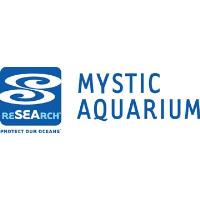Mystic Aquarium CEO and Environmentalist Dr. Stephen M. Coan warned of mass whale extinction and the urgent need for public policy, federal funding and research in last night’s speech at the Ferguson Library as part of the Civility in America Series.Mystic Aquarium's Coan Addresses Whale Extenction at Ferguson Library's Civility in America Series
There are drastic changes in the Arctic temperatures as a result of climate change and sea ice is disappearing at an alarming rate. Less than 30 vaquitas and fewer than 1,000 right whales swim in our waters at this moment. Four additional whale species number less than 10,000 each and Beluga whales in Cook Inlet, AK and the St. Lawrence Seaway in Ontario, Canada are endangered. The globe is headed for the next mass extinction.
The resulting news has renowned conservation researcher, Dr. Tracy Romano of Mystic Aquarium ramping her efforts to stem the tide of climate change and cetacean extinction. But, Coan indicates that is only part of the solution.
On Wednesday night, November 20, during his speech, Stemming the Tide of Whale Extinction: Why It Must Be Our Civil Duty, Coan discussed the ethical obligation of humans, as those dependent on the ocean for survival, to reverse the devastating trend of extinction for whale populations.
“If we value the earth we live on, we must act to protect whales. For many years, the message of saving the whales has been in our popular culture,” said Coan. “Today, however, saving whales is a clarion call. We cannot wait. As whales go, perhaps the human species goes too.”
Under Coan’s leadership, Mystic Aquarium’s conservation researchers, led my Romano, are taking steps to rapidly advance research to help whales and other cetaceans survive.
“We must fund this research as if our lives depend upon it, because they do,” added Coan. “We must then implement science-based public policies that positively change the current extinction trajectory”.
At Mystic Aquarium, beluga whales are studied as representative species of cetaceans. The team of scientists have advanced knowledge of the immune systems of whales, stress factors that cause lack of breeding, and other issues related to population declines.
“The holy grail of our research is to find conservation practices, methods and approaches that will help belugas increase reproductive success,” said Coan. “Understanding natural behaviors that lead to reproduction, stress factors that inhibit reproduction, behaviors and conditions that allow for successful gestation and birthing, are what we need to know now in order to save belugas and other whales from extinction”.
Examples of success in the conservation of whale species like the western South Atlantic Humpback show that advancement of knowledge, achieved through sound conservation research, can lead to the enactment of effective public policies and public awareness.
“As we think about the future of whales in relation to civil society,” added Coan “we should consider the words of Mahatma Ghandi, the greatness of a nation and its moral progress can be judged by the way it treats its animals.”
Stemming the Tide of Whale Extinction: Why It Must Be Our Civil Duty can be read in its entirety by visiting MysticAquarium.org.
The Civility in America series, sponsored by the Dilenschneider Group, The Ferguson Library, and Hearst Media Services, features some of the nation’s leading thinkers from a wide variety of professions, who provide their perspective on what must be done to restore civility in our country.
About Mystic Aquarium
Mystic Aquarium, a nonprofit 501(c)(3) organization, is counted among the nation’s leading aquariums, offering exemplary care to a variety of species while also serving as the northeast’s premier marine mammal rescue and rehabilitation center. Robust conservation and education programming along with unparalleled visitor experiences serve to strengthen personal connections to the animals and their environments. The mission of Mystic Aquarium is to inspire people to care for and protect the ocean planet through conservation, education and research, and introduces approximately 800,000 guests annually to thousands of animals through structured interpretations, specially-curated exhibits and hands-on interactions. As a leading research organization, Mystic Aquarium employs a full staff of scientists engaged in projects focused on the conservation and sustainability of our ocean planet.



